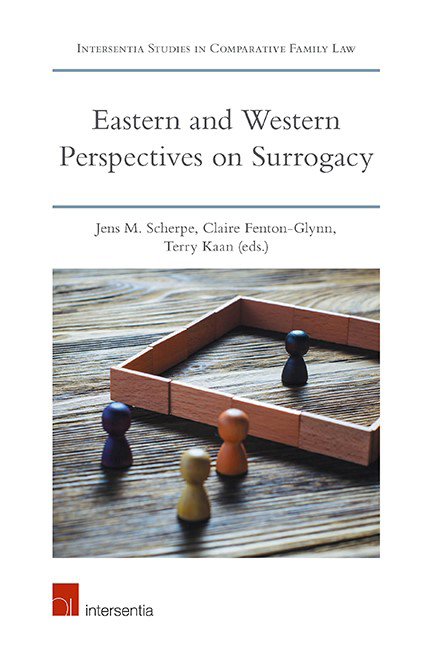Book contents
- Frontmatter
- Preface and Acknowledgements
- Contents
- List of Contributors
- Introduction
- Questionnaire
- PART I WESTERN PERSPECTIVES
- THE PROHIBITIVE APPROACH
- THE TOLERANT APPROACH
- THE REGULATORY APPROACH
- THE FREE MARKET APPROACH
- THE INFLUENCE OF INTERNATIONAL COURTS
- PART II EASTERN PERSPECTIVES
- THE PROHIBITIVE APPROACH
- A TOLERANT APPROACH?
- REGULATION THROUGH PROFESSIONAL MEDICAL BODIES
- Japan
- South Korea
- FROM FREE MARKET TO REGULATION
- PART III COMPARATIVE PERSPECTIVES ON SURROGACY
- Index
- About the Editors
South Korea
from REGULATION THROUGH PROFESSIONAL MEDICAL BODIES
Published online by Cambridge University Press: 26 June 2019
- Frontmatter
- Preface and Acknowledgements
- Contents
- List of Contributors
- Introduction
- Questionnaire
- PART I WESTERN PERSPECTIVES
- THE PROHIBITIVE APPROACH
- THE TOLERANT APPROACH
- THE REGULATORY APPROACH
- THE FREE MARKET APPROACH
- THE INFLUENCE OF INTERNATIONAL COURTS
- PART II EASTERN PERSPECTIVES
- THE PROHIBITIVE APPROACH
- A TOLERANT APPROACH?
- REGULATION THROUGH PROFESSIONAL MEDICAL BODIES
- Japan
- South Korea
- FROM FREE MARKET TO REGULATION
- PART III COMPARATIVE PERSPECTIVES ON SURROGACY
- Index
- About the Editors
Summary
Korea has a traditional culture that highly values the patriarchal bloodline and emphasises the family relationship. Thus, an infertile couple often has a strong desire to establish a family with their own child. As the number of infertile people and availability of artificial reproductive technology is increasing, the number of surrogate arrangements presumably is high, but no official statistical data is available.
In South Korea, there are no statutes or laws on surrogacy. Because of the culture that emphasises blood relations, it is the surrogate mother who goes to the medical institution in the name of the commissioning mother to enter the family registration as a child of the commissioning mother. In the absence of legal regulation of surrogacy, the problems raised from surrogacy contracts must be solved by the application and interpretation of the general law. Until recently, the prevailing opinion among legal scholars was that such contracts would be void. But as artificial reproductive technology including the surrogate arrangement are used more widely, calls for specific legislation on surrogacy get more support from legal scholars as well as the general public.
GENERAL LEGAL FRAMEWORK
In South Korea, neither statutes nor regulations address surrogacy despite the increasing practice of surrogacy, as revealed by the South Korean news reports and broadcasting media. Given that there are not even legal cases at courts generally, nor any decisions made on surrogacy by the Supreme Court, surrogacy contracts are neither illegal nor regarded as legal. Traditionally the bloodline of a family is of paramount importance in South Korea, and the commissioning parents generally hide the history of the child born to a surrogate by registering the baby as if born to the commissioning mother. Although not addressing surrogacy expressly, the Bioethics and Safety Act (in force since January 2005) indirectly affected surrogacy by regulating IVF clinics (on which see below Section 1.1.). Several bills have been proposed to regulate surrogacy in South Korea, but all were aborted (on which see below Section 1.2.). Meanwhile the South Korean Society of Obstetrics and Gynaecology issued Ethical Guidelines on Assisted Reproduction in January 2011, but they are nonbinding and not enforceable.
- Type
- Chapter
- Information
- Eastern and Western Perspectives on Surrogacy , pp. 449 - 466Publisher: IntersentiaPrint publication year: 2019



